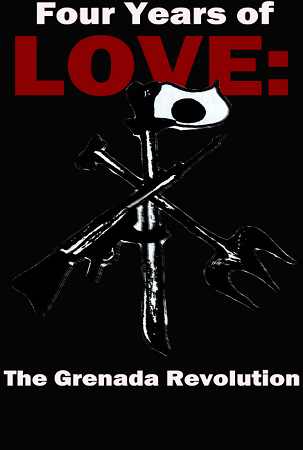
Four Years of Love: The Grenada Revolution 2021
Distributed by Spirit of '38 Productions
Produced by Richard Audley Vaughan
Directed by Richard Audley Vaughan
Streaming, 223 mins
College
History; Political Science; Social Movements
Date Entered: 07/20/2022
Reviewed by Joseph Baumstarck, Jr., University of Louisville, Southern Baptist Theological Seminary, Ivy Tech Community CollegeFour Years of Love: The Grenada Revolution is a lengthy three-part documentary that discusses the aims, problems, history, and eventual failure of the Maurice Bishop-inspired revolution in Grenada, 1979-1983. The eyes of five people focus on this revolution in the documentary. Anthony Bognes, Patsy Lewis, and Brian Meeks are faculty associated with Brown University. Bernard Coard, the Deputy Prime Minister and Minister of Finance for Grenada during this period, and Don Rojas, the press secretary for Maurice Bishop and eventual editor in chief of the Free West Indian, Grenada's official newspaper, assist in telling the story. The three Brown faculty members attempt to provide some context and balance to what is essentially a propaganda piece on the Grenada Revolution. Don Rojas delivers much of the commentary about the revolution's goals and the political science narrative regarding the Bishop regime. Coard is frequently a foil for Rojas and seems to portray a somewhat different and more bitter viewpoint regarding the revolution, especially its demise. Coard also provides some valuable insights into the political science behind what the revolution attempted to accomplish and has some valuable thoughts regarding its failure. Coard suffered significant personal loss and lengthy imprisonment due to the eventually failed revolution. However, this aspect is never directly addressed in the documentary, despite Coard presenting from a spartan room that appears to be a prison cell. This environment contrasts with the almost plush, comfortable office setting Rojas and the Brown faculty present from.
A documentary is undoubtedly needed to discuss, explain, and record the events that led up to this revolution, the successes and failures of the revolution, and why it eventually failed. This documentary fails to do this adequately. There are moments when insights, usually by Rojas and Coard, bring up significant ideas, but these are too few and too far between. In addition, these moments occur in isolation and provide little overall context. Far too much of the documentary consists of simple screens shots of the five speakers in an interview setting. A few historical photos and videos address some issues, but these are disjointed and piecemeal. As documented in other sources, the revolution's failure and its aftermath leave significant doubt about the extent to which the revolution was "four years of love" and whose loss citizens lamented deeply, as presented by the documentary's leading speakers.
Postcolonialism in the Caribbean, the Americas, and the broader world is addressed again in disconnected pieces. Colonialism significantly impacted Grenada and many places in the Americas. Better documentation of the poor infrastructure in Grenada prior to the revolution and its slow development under the Gairy regime, which the revolution overturned, would have added significantly, especially in contrast to the more rapid infrastructure development of the revolution, had it been documented. Unfortunately, the infrastructure development, which both Coard and Rojas claim as a significant achievement of the revolution, is discussed mainly in education and agriculture with little actual data presented. Health care and transportation infrastructure are addressed even less, while manufacturing, tourism, finance, industry, architecture, and media are largely ignored.
Increasing isolation by Bishop, even from the rest of the revolutionary government, is hinted at but never concretely discussed, even by Coard and Rojas, who were in the inner circle of the revolution. A brief mention of Bishop's drift toward Fidel Castro of Cuba and the negative impact this move had on the finances, international relations, especially with the United States, and the strengthening of internal dissent is briefly discussed. Marxist influences, a significant factor in the original ideals of the revolution, are downplayed, and their origins in the revolution are never addressed.
These issues and the very limited audience this documentary will likely appeal to result in the not recommended rating. Furthermore, its propaganda-like character, especially with the heavy influence of an involved press secretary, further limits the usefulness of this documentary in an academic setting. Age limitations further constrict the potential audience, with little incentive for younger students to benefit from it. The lack of interest in the Grenada Revolution by the general public of the United States at the time it occurred, and even limited public interest during the United States' direct involvement in Grenada as a result of the failure of the Bishop revolutionary government bodes poorly for any significant general interest now. Only academic libraries and institutions specializing in Caribbean area studies will likely need copies.
Published and licensed under the Creative Commons Attribution 4.0 license. Anyone can use these reviews, so long as they comply with the terms of the license.